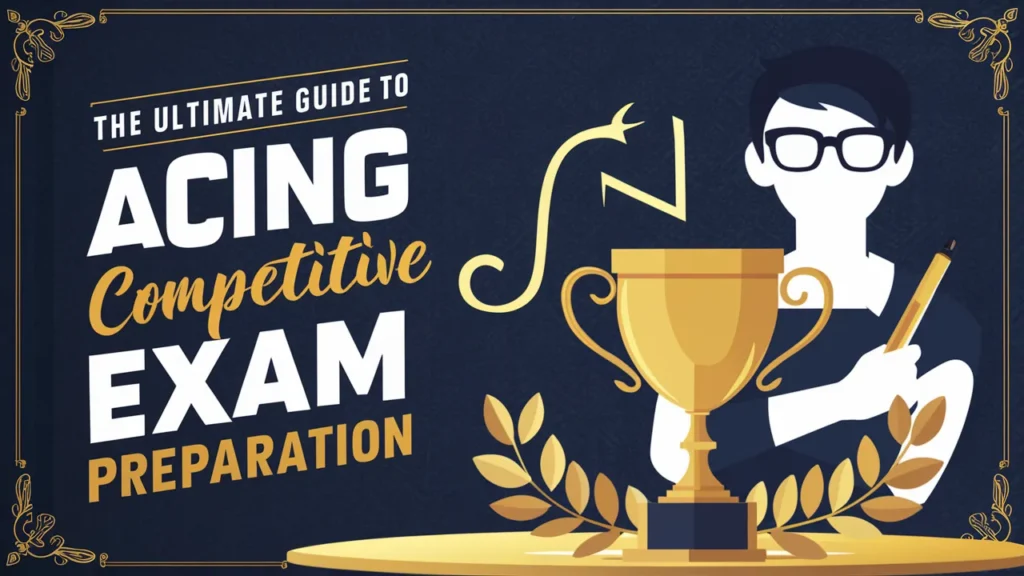
Competitive exams often bring stress and pressure, leading many students to experience anxiety. Managing this anxiety is crucial for a successful preparation journey. This guide will provide practical strategies to help students overcome exam anxiety and stay calm and focused throughout their preparation.
1. Understanding Exam Anxiety
Exam anxiety is a form of stress that many students face. It arises from the fear of failure or the pressure to perform well. When left unmanaged, exam anxiety can affect your ability to focus and perform during the exam.
Common Symptoms:
- Increased heart rate
- Sweaty palms
- Difficulty concentrating
- Sleep disturbances
- Feeling overwhelmed
Recognizing these symptoms is the first step toward overcoming exam anxiety.
2. Start Preparation Early
One of the leading causes of exam anxiety is last-minute cramming. Starting your preparation well in advance can significantly reduce this stress.
Effective Strategies:
- Create a Study Plan: Break down your syllabus into manageable portions. Allocate specific time slots for each topic.
- Set Realistic Goals: Avoid setting impossible targets. Small, achievable goals can keep you motivated.
- Early Start: Begin preparing early so you have enough time to review. This removes the pressure of trying to cram all the material just before the exam.
3. Use Mindfulness and Relaxation Techniques
Mindfulness and relaxation exercises can help calm your mind, reducing the effects of anxiety.
Techniques to Try:
- Deep Breathing: Inhale deeply, hold for a few seconds, and exhale slowly. This simple exercise calms your nervous system.
- Meditation: Practicing meditation for even 10 minutes a day can help you stay focused and reduce anxiety.
- Yoga: Physical exercises like yoga promote relaxation and improve concentration.
4. Avoid Perfectionism
Many students struggle with exam anxiety because they aim for perfection in every subject. While it’s good to strive for excellence, chasing perfection can lead to burnout and increased stress.
How to Manage:
- Focus on Progress: Understand that mistakes are part of learning. Celebrate small achievements and focus on continuous improvement.
- Let Go of Perfection: No one is perfect, and it’s important to focus on what you can do rather than stress about areas where you may fall short.
5. Simulate Exam Conditions
One of the most effective ways to reduce anxiety is to practice in a way that mirrors real exam conditions.
Preparation Tips:
- Take Mock Exams: Simulating the actual exam environment by taking timed mock tests can boost your confidence and reduce anxiety on the actual exam day.
- Time Management: Practice managing time by using a timer while answering practice questions. This will help you stay calm and organized during the real exam.
6. Maintain a Healthy Lifestyle
Physical well-being plays a significant role in reducing anxiety. A healthy body and mind are crucial for productive study sessions.
Healthy Habits to Adopt:
- Get Enough Sleep: Lack of sleep can worsen anxiety and reduce concentration. Aim for 7-8 hours of sleep each night.
- Balanced Diet: Eating a nutritious diet filled with fruits, vegetables, and brain-boosting foods like nuts and whole grains can help improve focus and memory.
- Exercise Regularly: Engaging in regular physical activity releases endorphins, which help reduce stress and improve your mood.
7. Talk About Your Concerns
Discussing your anxieties with friends, family, or a counselor can provide relief. Sometimes, sharing your concerns can offer perspective and reduce feelings of isolation.
Consider These Options:
- Talk to Friends and Family: Share your anxieties with trusted people who can provide emotional support.
- Seek Professional Help: If your anxiety becomes overwhelming, seek help from a counselor who can provide stress management techniques.
8. Develop Positive Self-Talk
The way you talk to yourself can influence how you feel. Negative thoughts, like “I’m going to fail,” can increase anxiety. Shifting to positive self-talk can help manage stress.
Self-Talk Tips:
- Use Affirmations: Replace negative thoughts with positive affirmations like “I am prepared” or “I can do this.”
- Visualize Success: Visualizing yourself succeeding can help you approach the exam with a positive and confident mindset.
9. Take Regular Breaks
Studying continuously without breaks can lead to burnout and increased anxiety. Taking regular breaks helps refresh your mind and maintain focus.
Break Strategies:
- Pomodoro Technique: Study for 25 minutes and then take a 5-minute break. After four sessions, take a longer break of 15-30 minutes. This method helps maintain focus while reducing fatigue.
- Relaxing Activities: Use your break time to do something you enjoy, such as walking, listening to music, or engaging in a hobby. This can help recharge your mind.
10. Stay Organized
Disorganization in your study routine or environment can increase anxiety. Staying organized will help reduce last-minute panic and improve your confidence.
Organizational Tips:
- Use a Study Planner: Track your progress and stay on top of deadlines with a planner. This helps avoid stress from procrastination or missed deadlines.
- Keep Your Study Space Tidy: A clean and organized workspace promotes concentration and helps reduce distractions.
Conclusion
Exam anxiety can feel overwhelming, but by following these strategies, you can manage it effectively. A combination of early preparation, mindfulness, positive self-talk, and maintaining a healthy lifestyle can help keep exam anxiety in check. Approach your exam with a calm mind, stay organized, and use these tips to confidently succeed in your competitive exam preparation.


